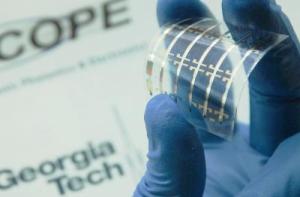In the quest to develop flexible plastic electronics, one of the stumbling blocks has been creating transistors with enough stability for them to function in a variety of environments while still maintaining the current needed to power the devices.
Online in the journal Advanced Materials, researchers from the Georgia Institute of Technology describe a new method of combining top-gate organic field-effect transistors with a bilayer gate insulator. This allows the transistor to perform with incredible stability while exhibiting good current performance. In addition, the transistor can be mass produced in a regular atmosphere and can be created using lower temperatures, making it compatible with the plastic devices it will power.
 Researchers at Georgia Tech have demonstrated a new transistor for use on flexible plastic electronics, known as a top-gate organic field-effect transistor with a bilayer gate insulator. The transistor's properties give it incredible stability while exhibiting good performance.
Researchers at Georgia Tech have demonstrated a new transistor for use on flexible plastic electronics, known as a top-gate organic field-effect transistor with a bilayer gate insulator. The transistor's properties give it incredible stability while exhibiting good performance.
The research team used an existing semiconductor and changed the gate dielectric because transistor performance depends not only on the semiconductor itself, but also on the interface between the semiconductor and the gate dielectric.
"Rather than using a single dielectric material, as many have done in the past, we developed a bilayer gate dielectric," said Bernard Kippelen, director of the Center for Organic Photonics and Electronics and professor in Georgia Tech's School of Electrical and Computer Engineering.
The bilayer dielectric is made of a fluorinated polymer known as CYTOP and a high-k metal-oxide layer created by atomic layer deposition. Used alone, each substance has its benefits and its drawbacks.
CYTOP is known to form few defects at the interface of the organic semiconductor, but it also has a very low dielectric constant, which requires an increase in drive voltage. The high-k metal-oxide uses low voltage, but doesn't have good stability because of a high number of defects on the interface.
So, Kippelen and his team wondered what would happen if they combined the two substances in a bilayer. Would the drawbacks cancel each other out?
"When we started to do the test experiments, the results were stunning. We were expecting good stability, but not to the point of having no degradation in mobility for more than a year," said Kippelen.
The team performed a battery of tests to see just how stable the bilayer was. They cycled the transistors 20,000 times. There was no degradation. They tested it under a continuous biostress where they ran the highest possible current through it. There was no degradation. They even stuck it in a plasma chamber for five minutes. There was still no degradation.
The only time they saw any degradation was when they dropped it into acetone for an hour. There was some degradation, but the transistor was still operational.
No one was more surprised than Kippelen.
"I had always questioned the concept of having air-stable field-effect transistors, because I thought you would always have to combine the transistors with some barrier coating to protect them from oxygen and moisture. We've proven ourselves wrong through this work," said Kippelen.
"By having the bilayer gate insulator we have two different degradation mechanisms that happen at the same time, but the effects are such that they compenstate for one another," explains Kippelen. "So if you use one it leads to a decrease of the current, if you use the other it leads to a shift of the thereshold voltage and over time to an increase of the current. But if you combine them, their effects cancel out."
"This is an elegant way of solving the problem. So, rather than trying to remove an effect, we took two processes that compliment one another and as a result you have a result that's rock stable."
The transistor conducts current and runs at a voltage comparable to amorphous silicon, the current industry standard used on glass substrates, but can be manufactured at temperatures below 150°C, in line with the capabilities of plastic substrates. It can also be created in a regular atmosphere, making it easier to fabricate than other transistors.
Applications for these transistors include smart bandages, RFID tags, plastic solar cells, light emitters for smart cards – virtually any application where stable power and a flexible surface are needed.
In this paper the tests were performed on glass substrates. Next, the team plans on demonstrating the transistors on flexible plastic substrates. Then they will test the ability to manufacture the bilayer transistors with ink jet printing technologies.
Source: http://www.gatech.edu/